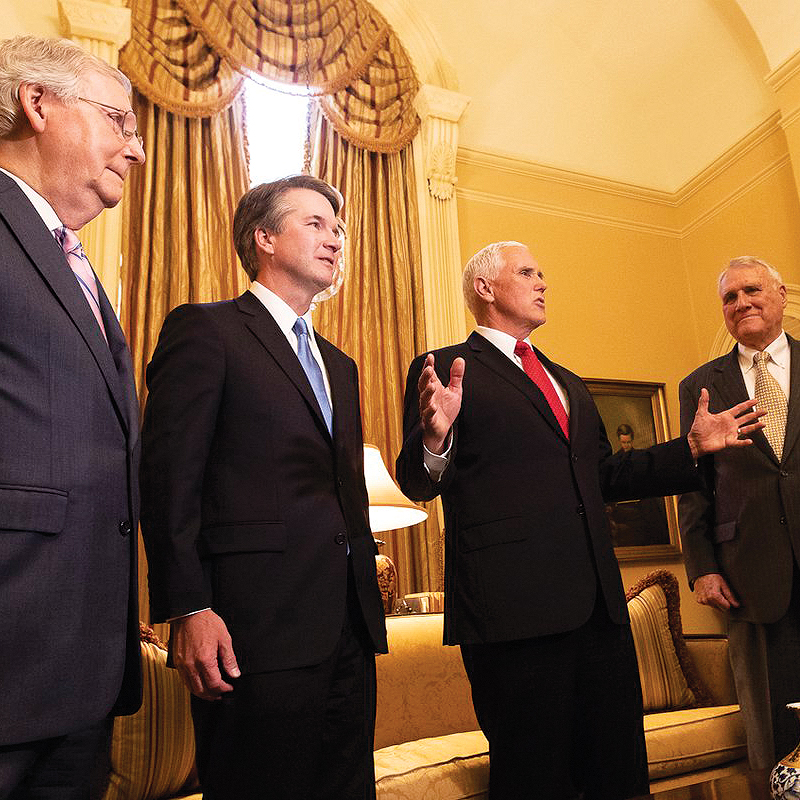
Wikimedia Commons
As the federal government probes Yale’s use of race in admissions, newly appointed Supreme Court Justice Brett Kavanaugh ’87 LAW ’90 may pose a threat to the use of affirmative action in schools across the country, according to legal experts interviewed by the News.
Kavanaugh was confirmed to the Supreme Court last week by one of the slimmest margins in American history, cementing a conservative majority of the nation’s highest court. According to four legal experts interviewed by the News, Kavanaugh is likely to rule against race-conscious efforts to increase diversity on university campuses. If the Department of Education and Department of Justice were to file a suit against Yale — which, according to Theodore Shaw, a law professor at the University of North Carolina at Chapel Hill, is “highly likely” — the University’s current race-conscious admissions policies may be ruled unconstitutional.
“The Supreme Court has just taken a shift to the right, and it is much more likely that it will rule against the constitutionality of diversity efforts by higher education institutions,” Shaw said. “The confirmation of Kavanaugh is a cause of deep concern among those who have worked so hard to keep opportunity open to individuals from historically underrepresented groups.”
A week before Kavanaugh’s confirmation, University President Peter Salovey issued a public statement, defending Yale’s use of race in admissions and denying all allegations of discrimination. In April, the Department of Justice and Department of Education began investigating Yale after a complaint — filed by the Asian-American Coalition for Education and 132 other Asian-American organizations in May 2016 — alleged that the University’s admissions processes deliberately limits the number of Asian-American students admitted each year.
Kavanaugh replaced retiring Justice Anthony Kennedy, longtime “swing vote” for many of the Court’s most ideologically charged rulings. Now, Chief Justice John Roberts — a conservative who has historically sided against “race-conscious efforts adopted to foster diversity and inclusiveness” — will be the court’s deciding member.
During his tenure as a Washington, D.C., circuit judge from 2006 to 2018, Kavanaugh did not issue any decisions on cases concerning racial preferences or affirmative action. But in 1999, when he was an attorney for the private law firm Kirkland & Ellis, he cowrote an amicus brief for Rice v. Cayetano — a Supreme Court case that challenged the legality of permitting only native Hawaiians to vote in an election for the trustees of the Office of Hawaiian Affairs. The plaintiffs questioned the legality of the rule that permitted only native Hawaiians to vote in an election that concerns an organization that allocates benefits to them. In the amicus, Kavanaugh argued it was unconstitutional for the state of Hawaii to use race to determine voter eligibility.
“This court’s cases establish that the equal protection clause prohibits racial classification except when such classifications are necessary and narrowly tailored to serve a compelling government interest,” the amicus brief stated.
In an interview with the News, Roger Clegg LAW ’80, who co-authored the amicus with Kavanaugh, argued that the provisions of Title VI — which “prohibit discrimination on the basis of race, color, or national origin” in federally funded institutions — should apply to an institution like Yale. He said that Yale’s race-conscious affirmative action policies contradict that federal law. Because Yale benefits from federal funding, those policies should be deemed unconstitutional if they were reviewed by the Supreme Court, Clegg said.
While the 1999 amicus demonstrates Kavanaugh’s conservative stance on race-based initiatives, Shaw said Kavanaugh’s practice as a private lawyer should not be used as “a definite proof” to predict how he will vote as a justice.
“You can’t conclude that everything that he wrote and said in the context of this case reflects what he would do as a justice,” Shaw said.
In his 2002 legal commentary “Ground Rules for Senators,” Sterling Professor of Law Akhil Amar ’80 LAW ’84also made a similar distinction between lawyers, who work for a client and act partially, and judges, who preside over a court and act impartially.
Still, Shaw said it is “extremely likely” that Kavanaugh will vote unfavorably toward affirmative action. The justice’s supporters expect him to vote against the use of race in admissions policies, Shaw said. In an interview with the News, Clegg agreed that Kavanaugh is likely to vote against affirmative action, noting the 1999 amicus brief they wrote together.
Following Kavanaugh’s nomination in July, Derrick Johnson, the president of the NAACP issued a statement calling Kavanaugh’s legal record on civil rights “deeply troubling.”
“[His views] on voting rights, affirmative action, equal employment, fair housing, and criminal justice could shut the courthouse door on justice for a generation,” Johnson said.
But under the administration of Donald Trump, the federal government has already moved against affirmative action in admissions. In July, the administration abandoned the Obama-era policy guidelines calling on universities to consider race in admissions. Shaw said he suspects that the Trump administration, given its hostility towards affirmative action, would file a suit against Yale.
He added that the current lawsuit against Harvard University brought on behalf of Asian-American students who failed to gain admission will probably be appealed to the Supreme Court. The case goes to court on Monday.
“If the Harvard case goes to the Supreme court, which it probably will, the court will likely reverse itself and take a position that cuts against efforts to open opportunities to people who historically have been excluded and disadvantaged,” Shaw said. “We expect that it is going to be much more difficult for institutions of higher education to prevail in these kinds of challenges. And I pray to be proven wrong.”
A 2016 Gallup Poll found that 70 percent of Americans support exclusively merit-based admissions to higher education institutions.
Lorenzo Arvanitis | lorenzo.arvanitis@yale.edu
Serena Cho | serena.cho@yale.edu .







